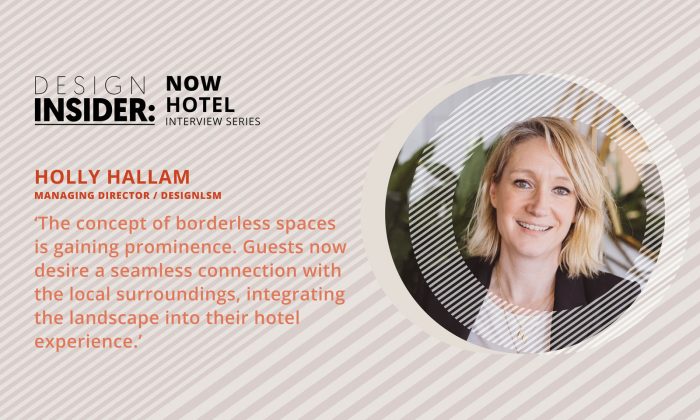Now Hotel Interview Series: Holly Hallam
Although over recent years it has not been a smooth journey for the hospitality sector there is much to celebrate!
There are new design and operational concepts being thoughtfully explored which deliver experiences requested by hotel guests and there are initiatives which progressively address sustainability, employee wellbeing and the integration of new technology.
This series of interviews aims to paint a clear picture of where the hotel sector is now and goes on to highlight which conversations are leading in this commercial sector, before looking at what the future may hold. We finish by learning a little more about what excites our interviewees when working in this often challenging sector.
We sat down with our Ambassador Holly Hallam to gather a clear insight into the hospitality sector from the viewpoint of a leading commercial interior designer.
Enjoy the full Now Hotel Interview Series here

Please could you introduce yourself and your role?
I’m Holly Hallam, Managing Director at DesignLSM – an award-winning, multi-disciplined design agency that specialises in strategy, branding and interior design for the hospitality industry. Since joining the team seven years ago, I’ve been responsible for leading the business into new territories; spearheading and driving the studio’s strategy service and creating unique consumer engagement ideas for DesignLSM’s vast array of clients. I’ve overseen fantastic creative projects across the globe, including the likes of Argentinian restaurant group Gaucho’s growth across the UK, North Audley Cantine’s expansion to the Middle East and most recently, the delivery of a monumental transformation of Heythrop Park Hotel, a 337-key Grade II* listed country house hotel.
Within the hospitality sector what is the key thing that we can celebrate right now?
There’s plenty to celebrate, but what has been rather remarkable is the adaptability and incredible resilience of the industry in the face of one of the toughest periods it will have ever faced, with Brexit and COVID-19. It’s been a challenging journey, but the sector has fiercely bounced back.
What’s impressive is how businesses have embraced innovation and technology like never before. They’ve undergone digital transformations that have not only improved guest experiences but also streamlined their operations. The result? A more seamless and personalised hospitality experience for all.
The dedication and passion exhibited by hospitality professionals has helped the industry to weather the storm, applying a forward-thinking approach to address the ever-growing demands of consumers and commercial constraints.
What are the hurdles which are currently stalling the hotel and/or hospitality sector’s growth?
The hotel and hospitality industry is currently facing some major roadblocks that are putting pressure on the sector – and we can’t ignore the tough external economic factors at play here. Rising inflation, fluctuating exchange rates, and political instability are not only tightening the financial screws but also impacting travel patterns and consumer spending habits.
Another big hurdle is the serious shortage of skilled workers which has been exacerbated since the Brexit fallout. If restaurants and hotels want to thrive in the long run, they need to focus on and improve their recruitment, training, and retention strategies. Collaborating with charities like The Right Course can bring benefits to businesses. This inspiring organisation, in particular, provide training opportunities, job placements, and support for prison inmates that are determined to build a more positive future for themselves upon their release. This collaboration not only helps address workforce shortages within the industry but also contributes to social responsibility, reducing the rates of re-offences, and strengthens the community.
What are the most important conversations being had in the sector?
The concept of borderless spaces is gaining prominence. Guests now desire a seamless connection with the local surroundings, integrating the landscape into their hotel experience. In response, hotels are considering the needs of the community and maximising the use of local suppliers and producers, aiming to provide an authentic and immersive experience for guests.
Another discussion revolves around creating multi-functional spaces. With the rise of remote workers and digital nomads, hotels are finding new ways to adapt; we’re designing spaces that can effortlessly transition from leisure to business, catering to the evolving demands of modern travellers.
We’re also seeing the sector placing greater emphasis on delivering personalised guest experiences. Guests now seek to tailor trips to meet their specific preferences and expectations and connect on a deeper level, aligning with brands that share their values and resonate with their emotions.
What is on the horizon for the hospitality sector which makes your heart beat faster?
One key area of interest is the emergence of new technologies, which are set to bring about substantial transformations. From artificial intelligence to augmented reality, these innovations have every potential to enhance guest experiences beyond the physical hotel stay.
While technology will bring about significant changes, the focus on wellness in design is prevalent. A deliberate approach to crafting spaces that prioritise guests’ physical and mental well-being opens up opportunities for immersive experiences that allow guests to disconnect from the digital world that surrounds them. Designing environments that facilitate relaxation, rejuvenation, and a sense of harmony within oneself, will undoubtedly shape the future of the hospitality industry, addressing the emotional needs of travellers.




